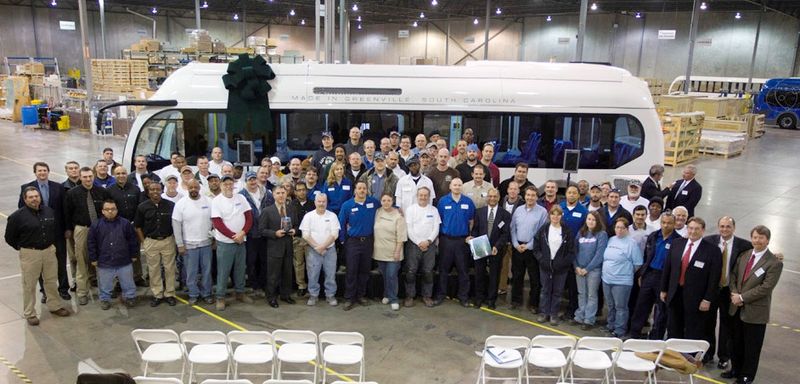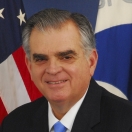
Editor's Note: This was originally posted on the Department of Transportation's blog.
Yesterday, Federal Transit Administrator Peter Rogoff and I toured the Greenville, South Carolina, bus manufacturing plant of Proterra, Inc. And I don't think you could find a better demonstration of the American innovation President Obama invoked in his State of the Union address Tuesday night.
When the President said that America's small businesses need to out-innovate, out-educate, and out-build their competition, he must have had Proterra in mind.
In 2009, Proterra did not have the financial resources or customer orders to commercialize its fast charge battery bus and charging station. Although FTA grants had helped support the company's fuel-cell research, they were unable to grow from a research and development company into an assembly line manufacturer of high technology vehicles.
But with help from Department of Transportation grants to transit agencies across the country, Proterra has been able to make that leap.
Now, this company is researching and developing fresh transit technology to reduce fuel costs, oil dependence, and air pollution. They are investing in a new plant at Clemson University, where they will collaborate with some of the brightest minds on campus and train the next generation of transportation engineers and scientists. And they are building the world’s first all electric fast-charging buses.
And did I mention that they are also creating quality jobs for hardworking South Carolinians? Thanks to smart government investments and private sector creativity, the buses of the future are being conceived and built by skilled American workers and engineers.
Plus, Proterra's evolution into a manufacturer has generated ripple effects across the country. Proterra's buses use bus charging station components built by Aerovironment in Monrovia, California. They also feature lithium batteries produced by Altairnano in Reno, Nevada, and propulsion systems manufactured by UQM in Longmont, Colorado.
“We expect Proterra to become a significant customer for our electric propulsion systems over the next several years as they ramp up their delivery of buses, resulting in the creation of jobs at our Longmont facility,” said , UQM President and CEO Eric Ridenour.
One of Proterra's good jobs went to Julie Shepherd. Julie is a single mother--I also met her delightful daughter Autumn--and yesterday she told me one of those stories that make me so proud of the Department of Transportation and make all of us so proud to live in America.
Prior to coming to work at Proterra, Julie worked at a local BMW plant, but she was laid-off twice and was really struggling to make ends meet. Then she was hired by Proterra and trained in their Colorado headquarters.
Today, Julie is a team leader for 15 other Proterra employees on five bus component assembly stations in the Greenville plant. She has begun saving for Autumn's education. And thanks to the financial security of her new job, she recently bought her family's first house.
"I have a lot of friends who are very excited about Proterra being here," said Julie. "Everybody’s really excited about what we’re doing. When that first bus rolled out the door, we all ran out just to watch it."
The Proterra story isn’t just about how government can deliver the extra little boost to help an entrepreneur turn a bold idea into a transformational product. It's about ordinary Americans dreaming big and building big.
By rolling off the line the world's first fast-charge all-electric transit buses with more American-made parts and materials than any other bus in service, Proterra and its more than 120 Greenville workers have certainly built big.
With its plans for a new manufacturing plant, we know that Proterra's big dreaming hasn't stopped. Founder Dale Hill expects Proterra to reach 350 workers by year-end and 1,300 by 2015: "If we are good stewards of the opportunity that's been given to us, we can become one of the leading bus manufacturers in the world."
As President Obama said, there's a future to win; Proterra has already gotten started.



